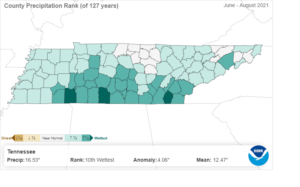
As the remnants of Hurricane Nicholas finally wash away, Nashville will near its average annual rainfall total with three months left on the calendar.
The city just faced its fifth wettest summer to date, with 18 inches of rain between June and August, despite a drier-than-usual June. This astronomical summer will rank as the wettest or second-wettest on record, says Matt Reagan, a meteorologist at the National Weather Service in Nashville.
More than three-quarters of the rain in July and August fell on six days — which is consistent with the trends of extreme rainfall in the Southeast, according to the most recent National Climate Assessment.
And this followed the city’s seventh wettest spring, thanks to the heavy rains in late March.
 Courtesy National Oceanic and Atmospheric Administration
Courtesy National Oceanic and Atmospheric Administration Despite the August flood, Humphreys County did not experience an abnormally rainy summer, because the highly-localized storm only affected a portion of the county.
Outside Nashville, many other cities and counties have faced extraordinary extreme rainfall events this year and wetter-than-usual seasons. Wayne, Giles and Bradley counties recorded their wettest summers in the 127-year documented history, and about two dozen other counties ranked in their respective top 10%. Statewide, it was Tennessee’s 10th wettest summer on record, according to the National Oceanic and Atmospheric Administration.
Fall has been off to a wet start for the state. Some areas of Tennessee may have received upwards of 12 inches of rainfall since Friday, according to radar estimates.

